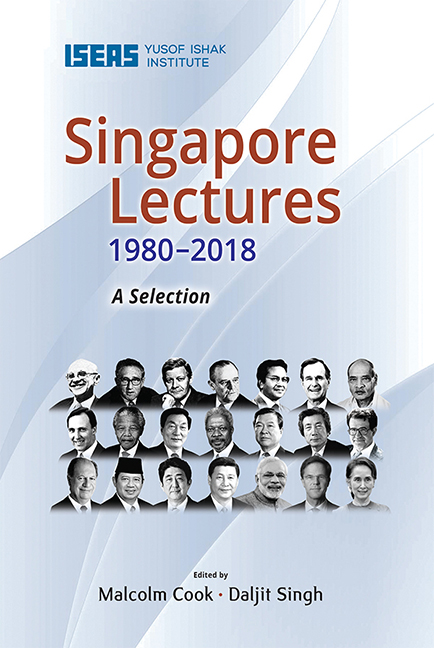Book contents
- Frontmatter
- Contents
- Introduction
- 1 The Invisible Hand in Economics and Politics
- 2 American Foreign Policy: A Global View
- 3 The Soviet Union: Challenges and Responses as Seen from the European Point of View
- 4 Trends in the International Financial System
- 5 Regionalism, Globalism and Spheres of Influence: ASEAN and the Challenge of Change into the 21st Century
- 6 US Policy in the Asia-Pacific Region: Meeting the Challenges of the Post-Cold War Era
- 7 India and the Asia-Pacific: Forging a New Relationship
- 8 Australia, Asia and the New Regionalism
- 9 South and Southern Africa into the Next Century
- 10 China and Asia in the New Century
- 11 Global Values: The United Nations and the Rule of Law in the 21st Century
- 12 Peace on the Korean Peninsula and East Asia
- 13 Japan and ASEAN in East Asia: A Sincere and Open Partnership
- 14 EU and Asia: Sharing Diversity in an Inter-regional Partnership
- 15 Global Challenges in the 21st Century: A View from Chile
- 16 Indonesia: The Challenge of Change
- 17 Japan and ASEAN, Always in Tandem: Towards a More Advantageous Win-Win Relationship through My “Three Arrows”
- 18 Forging a Strong Partnership to Enhance Prosperity of Asia
- 19 India’s Singapore Story
- 20 The Netherlands, Singapore, Our Regions, Our World: Connecting Our Common Future
- 21 Democratic Transition in Myanmar: Challenges and the Way Forward
- The Singapore Lecture Series
- The Editors
4 - Trends in the International Financial System
Published online by Cambridge University Press: 09 October 2021
- Frontmatter
- Contents
- Introduction
- 1 The Invisible Hand in Economics and Politics
- 2 American Foreign Policy: A Global View
- 3 The Soviet Union: Challenges and Responses as Seen from the European Point of View
- 4 Trends in the International Financial System
- 5 Regionalism, Globalism and Spheres of Influence: ASEAN and the Challenge of Change into the 21st Century
- 6 US Policy in the Asia-Pacific Region: Meeting the Challenges of the Post-Cold War Era
- 7 India and the Asia-Pacific: Forging a New Relationship
- 8 Australia, Asia and the New Regionalism
- 9 South and Southern Africa into the Next Century
- 10 China and Asia in the New Century
- 11 Global Values: The United Nations and the Rule of Law in the 21st Century
- 12 Peace on the Korean Peninsula and East Asia
- 13 Japan and ASEAN in East Asia: A Sincere and Open Partnership
- 14 EU and Asia: Sharing Diversity in an Inter-regional Partnership
- 15 Global Challenges in the 21st Century: A View from Chile
- 16 Indonesia: The Challenge of Change
- 17 Japan and ASEAN, Always in Tandem: Towards a More Advantageous Win-Win Relationship through My “Three Arrows”
- 18 Forging a Strong Partnership to Enhance Prosperity of Asia
- 19 India’s Singapore Story
- 20 The Netherlands, Singapore, Our Regions, Our World: Connecting Our Common Future
- 21 Democratic Transition in Myanmar: Challenges and the Way Forward
- The Singapore Lecture Series
- The Editors
Summary
On 25 November 1986, economist and former Prime Minister of France Raymond Barre gave the 7th Singapore Lecture after being welcomed by Senior Minister S. Rajaratnam. Professor Barre was the third of three eminent economists to give a Singapore Lecture, starting with Professor Milton Friedman in 1980. Professor Barre's lecture is a very lucid analysis of the systemic risks inherent to the post-Bretton Woods international financial system. A decade prior to the cataclysmic Asian Financial Crisis centred in Southeast Asia, it serves as a timely reminder of the power and economic and political risks of global financial flows.
Excellencies, Ladies and Gentlemen.
I am very grateful to the Institute of Southeast Asian Studies and to its Director, Professor Sandhu, for the kind invitation to deliver the Singapore Lecture 1986. I thank the Senior Minister, Mr Rajaratnam, for introducing me with such witty and gracious words. Mr Minister, I am not Godot because I am here; I am an economist—but I do not know whether I am an optimist or a pessimist. I am an economist who has to face facts, and the facts are strong and problematic. I have had to face facts in the European Community, I have had to face facts as Prime Minister of my country. And based on my experiences, I feel that the main quality of an economist should be humility. He tries to solve problems but he is not sure to succeed. What is important is neither optimism nor pessimism, but lucidity. And I will try tonight to be lucid about the problems which I have chosen to discuss.
Firstly, let me say that I am honoured and pleased to address such a distinguished audience, in a country which, despite its small size, plays a very important role in this region under the leadership of its Prime Minister, Mr Lee Kuan Yew. It is an example of hard work, innovation, and adaptability. It has reaped the fruits of its continuous effort. May I express today, to Singapore, one of the dragons of Southeast Asia, all my wishes for the same success in the future.
- Type
- Chapter
- Information
- Singapore Lectures 1980-2018 , pp. 57 - 75Publisher: ISEAS–Yusof Ishak InstitutePrint publication year: 2020

